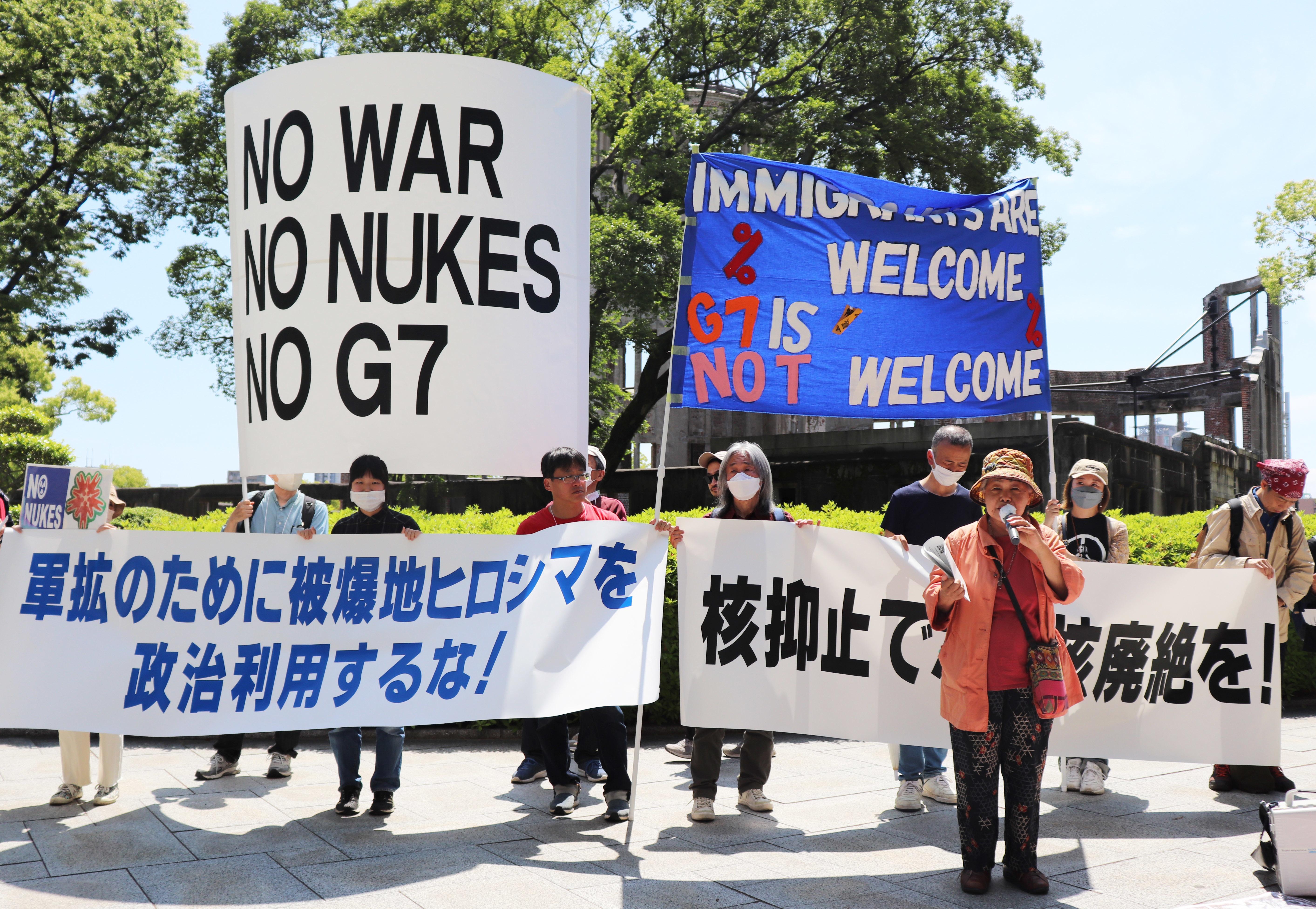Rhetoric rises ahead of meeting amid US moves to impose 'tech hegemony'
 Japanese people rally at the Hiroshima Peace Memorial Park in protest against the G7 summit. (PHOTO / XINHUA)
Japanese people rally at the Hiroshima Peace Memorial Park in protest against the G7 summit. (PHOTO / XINHUA)
Recent disputes between the West and China over technology seem to be a matter of who cast the first stone.
The West has placed China under heavy technology restrictions, most notably by the CHIPS Act passed by the US Congress in August.
Earlier there was the Huawei saga and the December 2018 arrest of its chief financial officer, Meng Wanzhou, in Canada. US allies in Europe were pressed not to do business with the company.
Visits by US lawmakers to Taiwan last summer also fueled tensions. Nancy Pelosi, then House speaker, visited the island a week before the CHIPS Act was passed.
The act provided roughly $280 billion in new funding to boost domestic research and manufacturing of semiconductors, with the objective to counter China.
Taiwan produces more than 60 percent of the world's semiconductors, according to The Economist. Most of the chips are made by a single company, Taiwan Semiconductor Manufacturing Company. Many US tech companies are customers of the company.
Ahead of the upcoming G7 meeting in Japan, which starts on Friday, anti-China rhetoric has been rising on economic issues.
An article in The Wall Street Journal on Sunday carried the headline, "G-7 Leaders Expected to Take Aim at Chinese 'Economic Coercion'".
"Did you doubt that #G7 exists to push US foreign policy? Bloomberg reports the (Joe) Biden administration plans to get G7 to copy US limits on foreign investment in China's high-tech industries (AI, chips, etc) at G7 on 19 May in Tokyo," author Tony Norfield tweeted on April 21.
Chinese Foreign Ministry spokesman Wang Wenbin told reporters at a briefing in Beijing last week that when it comes to international rules, the US "is in no position to point fingers at other countries".
Uncertain outcome
The outcome of efforts by the US to align allies against China remains uncertain.
"The US and Japan are fairly united," said Thomas Cynkin of the Atlantic Council's Scowcroft Center for Strategy and Security, The Wall Street Journal reported. "But the Europeans have been very reluctant."
In March, China announced a review of Micron, a semiconductor company based in Idaho, after the US enacted export bans on advanced semiconductors and production equipment in October.
Colin Hawes, an associate law professor at the University of Technology in Sydney, was quoted by MarketWatch as saying, "The constant recent US political attacks and draconian sanctions on China will definitely impact the way that these cases play out."
James Zimmermann, a longtime China-based businessman and former chairman of the American Chamber of Commerce in China, told MarketWatch: "Someone is bound to get hurt in this tetchy environment."
In October, the White House published a set of export controls including a measure to cut China off from certain semiconductor chips made anywhere in the world with US equipment, vastly expanding its efforts to hamper Beijing's technological advances.
The rules followed restrictions sent in letters last year to US toolmakers KLA, Lam Research and Applied Materials, effectively requiring them to halt shipments of equipment to wholly Chinese-owned factories producing advanced logic chips.
Senior US government officials said in October that many of the measures were aimed at preventing foreign firms from selling advanced chips to China or supplying Chinese firms with tools to make their own advanced chips. They conceded, however, that they had not secured any promises from allied nations that they would enact similar measures.
The new regulations severely restricted exports of US equipment to Chinese memory chipmakers and restricted shipments to China of chips used in supercomputing systems.
At the time, China's Foreign Ministry spokeswoman Mao Ning called the move an abuse of trade measures designed to reinforce the US' "technological hegemony".
Agencies contributed to this story.


